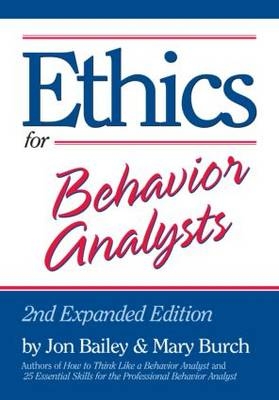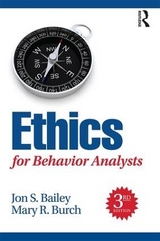
Ethics for Behavior Analysts
Routledge (Verlag)
978-0-415-88030-5 (ISBN)
- Titel erscheint in neuer Auflage
- Artikel merken
Originally published in 2005, this second, expanded edition of Ethics for Behavior Analysts is a valuable resource in preparing behavior analysts for the difficult task of providing quality services. Specifically, this book is useful to behavior analysts who are working in the clinical, educational, and rehabilitative fields with clients who are developmentally disabled, are on the autistic spectrum, or have a variety of moderate to severe behavior problems that require treatment by experts using the latest evidence-based methods. The content is organized around the Behavior Analyst Certification Board Guidelines, and contains detailed ethical scenarios designed to get readers thinking about potential issues and dilemmas that may arise within their work. Responses to Case Scenarios are found at the end of each appropriate chapter, along with valuable tips found throughout the text.
Jon Bailey, PhD, Emeritus Professor of Psychology at Florida State University, teaches graduate courses for behavior analysts. Dr. Bailey is a founding director of the Behavior Analyst Certification Board® and he is the president of the Association of Professional Behavior Analysts (APBA). Mary Burch, PhD, is a Board Certified Behavior Analyst®. Dr. Burch has more than twenty years experience in developmental disabilities. She has been a behavior specialist, QMRP, unit director, and consulting behavior analyst in developmental disabilities, mental health, and preschool settings.
Part I: Background for Ethics in Behavior Analysis. How We Got Here. Core Ethical Principles. What Makes Behavior Analysis Unique? Most Frequent Ethical Problems. Everyday Ethical Challenges for Average Citizens and Behavior Analysts. Part II: Understanding and Following the Behavior Analyst Certification Board Guidelines for Responsible Conduct. Responsible Conduct of a Behavior Analyst (Guideline 1). The Behavior Analyst's Responsibility to Clients (Guideline 2). Assessing Behavior (Guideline 3). The Behavior Analyst and the Individual Behavior Change Program (Guideline 4). The Behavior Analyst as Teacher or Supervisor (Guideline 5). The Behavior Analyst and the Workplace (Guideline 6). The Behavior Analyst's Ethical Responsibility to the Field of Behavior Analysis (Guideline 7). The Behavior Analyst's Ethical Responsibility to Colleagues (Guideline 8). The Behavior Analyst's Ethical Responsibility to Society (Guideline 9). The Behavior Analyst and Research (Guideline 10). Part III: Professional Skills for Ethical Behavior Analysts. Conducting a Risk-benefit Analysis. Delivering the Ethics Message Effectively. Avoiding the "Slippery Slope" of Ethical Problems by Using a Declaration of Professional Services. Part IV: Tips, Guidelines, Index, and Scenarios for Students. A Dozen Practical Tips for Ethical Conduct on Your First Job. Appendix A: Behavior Analyst Certification Board Guidelines. Appendix B: Index for Behavior Analyst Certification Board Guidelines for Responsible Conduct. Appendix C: 50 Ethics Scenarios for Behavior Analysts. Appendix D: Suggested Further Reading.
| Zusatzinfo | 5 Line drawings, black and white; 5 Tables, black and white |
|---|---|
| Verlagsort | London |
| Sprache | englisch |
| Maße | 152 x 229 mm |
| Gewicht | 534 g |
| Themenwelt | Medizin / Pharmazie ► Medizinische Fachgebiete ► Psychiatrie / Psychotherapie |
| Studium ► Querschnittsbereiche ► Geschichte / Ethik der Medizin | |
| Recht / Steuern ► EU / Internationales Recht | |
| Recht / Steuern ► Privatrecht / Bürgerliches Recht ► Medizinrecht | |
| ISBN-10 | 0-415-88030-0 / 0415880300 |
| ISBN-13 | 978-0-415-88030-5 / 9780415880305 |
| Zustand | Neuware |
| Informationen gemäß Produktsicherheitsverordnung (GPSR) | |
| Haben Sie eine Frage zum Produkt? |
aus dem Bereich



